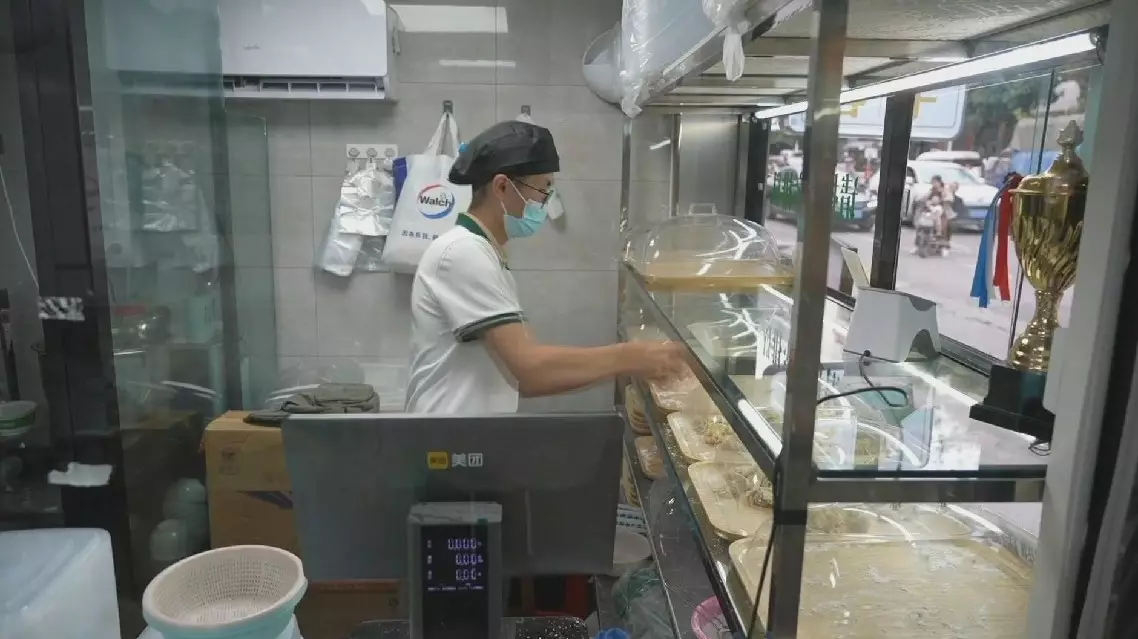In recent years, an increasing number of young Chinese entrepreneurs have been leaving the fast-paced big cities to return to their hometowns to launch businesses.
In Sihui County, south China's Guangdong Province, a chic teahouse stands out amidst the area's numerous self-built houses. The teahouse features Chinese-style elements, such as calligraphy, traditional lanterns, porcelain vase, and wooden furniture.
The teahouse is the brainchild of Xu Shihao, who returned to China after gaining work experience in Dubai. With a background in interior design, Xu dedicated several months to redesigning this space. "After gaining some business experience abroad, I returned home to find milk tea shops popping up all over my hometown, about 60 in this county with about 300,000 people. They're very welcomed by young people. So I want to promote traditional Chinese tea culture by incorporating it into the modern China-chic style," Xu said.
To hone his tea-brewing skills, Xu spent months in Fujian, China's premier tea-producing province neighboring Guangdong. Xu admitted that getting started was challenging, and it took him over half a year to find a suitable location, one that was both affordable and allowed for free rein in renovations.
The rent for the space is a modest 800 yuan per month, a fraction of what one would pay in metropolitan areas. Once the space was secured, the next hurdle was attracting young customers, a challenge Xu tackled through social media promotion.
As his business gained momentum, Xu began to open coffee shops and appreciate the leisurely pace of life in the county.
"Besides just drinking coffee, there is also emotional value associated with it. I really like the atmosphere here," said one of his customers.
"It's rare to find such a place in the county where you can enjoy coffee for hours," said another customer.
The convenience of transportation, lower living costs, and a relaxed lifestyle have made Sihui increasingly appealing to young entrepreneurs returning home.
Xu opened two additional milk tea shops in Huaiji County, a two-hour drive from the original location.
Meanwhile, a streetside wonton shop has piqued local interest with its "secret recipe." The shop is owned by Zhou Changyang, a Guangzhou University graduate who worked in Guangzhou for six years before returning home this year to open this wonton shop.
His store offers over ten flavors of wontons, a stark contrast to the single flavor typically found in traditional stores; what's more, his use of automated boiling is uncommon in the county.
Zhou spent months perfecting his technique, able to make a wonton in just three seconds. His days are filled with making and selling wontons, with his shop operating from 06:30 to 01:00 the following day.
"In Guangzhou, I've worked in construction, catering, and milk tea businesses. I have seen how big-city brands are more intelligent and have richer product offerings, so I wanted to bring these new ideas back to my home county," said Zhou.
After conducting research, Zhou found that there are around 100 wonton shops in Huaiji, each serving about 100 customers daily. If each customer visits once a week, that's roughly 70,000 customers per week. With a population of nearly 200,000, Zhou sees significant market potential.
"Most people are still used to the traditional wonton flavor, and don't know that automated equipment is cleaner and more hygienic, or that they can buy wontons to cook at home for a lower price. I've been promoting this through social media, and after a few months, I started to attract regular customers," Zhou said.
"The store and equipment look much cleaner than traditional wonton stores," said a customer.
In Huaiji, entrepreneurial support includes incubation platforms, and loans of up to 500,000 yuan (about 70,000 U.S. dollars).
Zhou has used his savings and partnered with friends to open his current shop. For his next venture, he plans to apply for entrepreneurial funding.
While some entrepreneurs are still adopting to the slower pace, others are focused on introducing new business models. Many say that starting a business in a small county is no easier than working in big cities, but they all agree that the opportunities are boundless.

Young Chinese entrepreneurs leave big cities to explore opportunities closer to home









